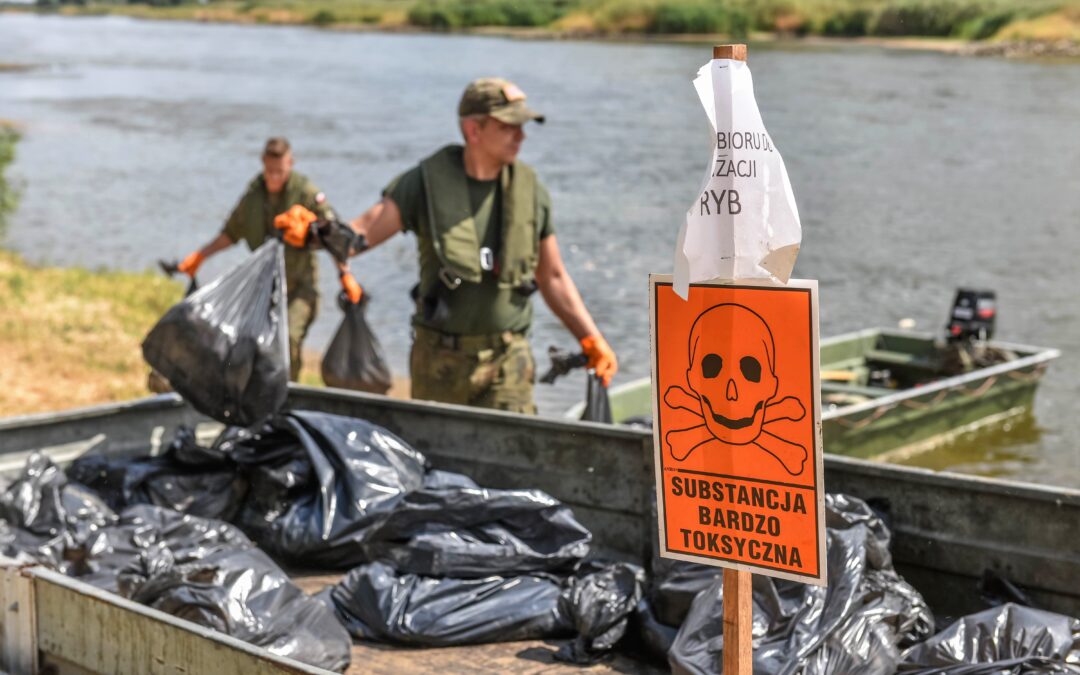Poland has presented a summary of a preliminary report into the causes of an environmental disaster in the Oder river that has led to the death of nearly 250 tonnes of fish since the end of July. However, the findings remain inconclusive, with scientists noting a number of possible factors behind the incident.
The authorities in Poland and Germany – along whose border the river runs – have commissioned reports into the disaster and both are due to be published tomorrow. However, Poland decided to announce an outline of its findings a day early, before it releases the full 300-page document tomorrow.
An opposition MP, Małgorzata Tracz of the Greens, accused the government of “doing everything on the quiet” and of producing a report that “clearly shows the catastrophe is the fault of people and the neglect of the state” but that fails to identify the guilty parties.
Założenia raportu wydają się dobre, podobnie rekomendacje. Naukowcy zrobili dobrą robotę, tylko ten rząd nie wyciągnie z tego wniosków. Naukowcy mówią o szkodliwym przeregulowaniu Odry, a wiceminister Gróbarczyk prze jak taran do dalszej regulacji, zgubnej dla rzeki.
— Małgorzata Tracz (@GoTracz) September 29, 2022
Although an earlier hypothesis that so-called golden algae may have been responsible for the deaths of the fish seems to be partially confirmed, no clear single culprit has been identified.
“There were many overlapping factors contributing to this situation,” said Małgorzata Golińska, deputy climate and environment minister and chief conservationist. “The team has not finished its work; we cannot yet answer all the questions.”
Among the factors identified by the study as negatively affecting the state of the Oder were low water levels associated with hydrological drought, high temperatures, exposure to sunlight, low water flows, and high salinity. Mercury and nickel were also found in water samples, but not in concentrations harmful to fish.
“The river is far from its natural state and its conditions are highly unsatisfactory regardless of the situation this year,” said Agnieszka Kolada, head of the Department of Water Protection at the Institute of Environmental Protection, at today’s announcement.
“The die-off was caused by rapid environmental changes,” she added. “Damage to the gills is associated with haemolytic toxins, hence the hypothesis of toxic algae.”
A total of 334 fish samples were taken for testing for the presence of 300 substances. Prymnesium parvum, known as golden algae, was found in 78% of the samples, Kolada noted.
“A bloom alone does not imply the production of toxins,” she explained. But “genetic analyses…indicate that the Prymnesium parvum cells have the potential to produce toxins”.
The risk of a toxic bloom increases with high conductivity (which has been observed on the Oder river), and toxicity is also promoted by a pH greater than 7.
“A river with a highly altered environment doesn’t cope well with such a situation. There is a real concern that the situation could arise in other ecosystems. We need to be vigilant,” said Kolada.
In order to prevent the disaster from repeating in future, the scientists recommended that a system of continuous measurement of water quality, accessible online, should be set up.
They also pointed out the need to monitor those discharging into the river and to link water permits to the results of the river tests.
“If we have low water levels, permits need to be temporarily suspended. The sum of small discharges can have catastrophic consequences, even if it is a single discharge. There is also a need to implement an information and response system,” said Kolada.
After the poisoning of the river became clear in August, state authorities in Poland were widely accused of failing to act quickly and effectively enough. In response, the prime minister fired the heads of Wody Polskie – the state manager of Poland’s waters – and the General Environmental Protection Inspectorate (GIOŚ).
The crisis also sparked a war of words with Germany. In August, Poland’s climate minister accused German media of spreading “fake news” about the finding of pesticides in water samples.
After Germany’s environment minister said that the disaster appeared to be “man made”, a Polish deputy infrastructure minister said it could have been caused in Germany and accused Berlin of exploiting the crisis to block Polish redevelopment of the river,
Note: this article has been corrected to rectify an error in the quantity of dead fish taken from the river.
Main image credit: Wladyslaw Czulak / Agencja Wyborcza.pl

Alicja Ptak is deputy editor-in-chief of Notes from Poland and a multimedia journalist. She has written for Clean Energy Wire and The Times, and she hosts her own podcast, The Warsaw Wire, on Poland’s economy and energy sector. She previously worked for Reuters.




















